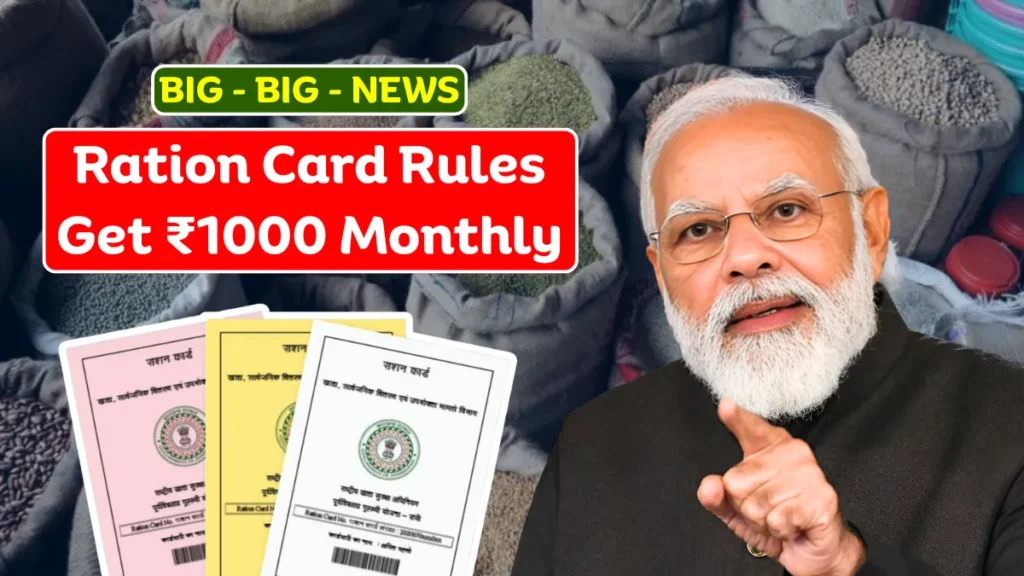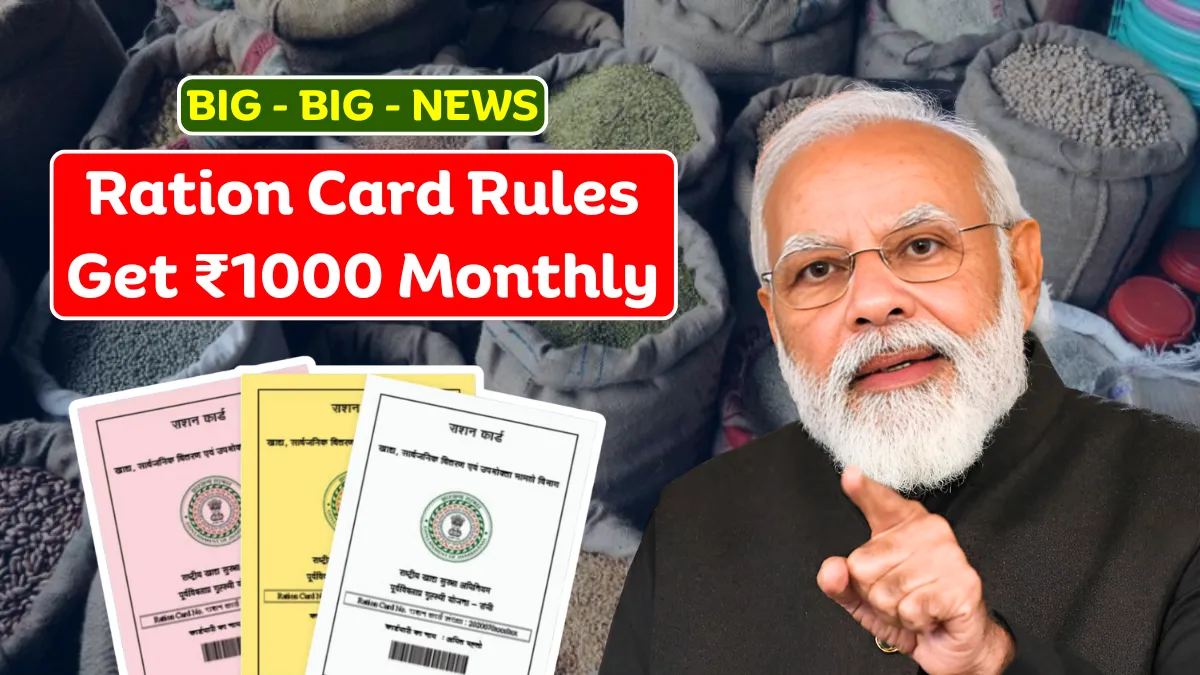The government has introduced new rules for ration card holders in 2025 that are set to bring significant benefits to millions of families across the country. One of the most talked-about changes is the monthly financial benefit of ₹1000 for all ration card holders.
This update aims to provide more direct support to vulnerable sections of society and ensure food security with an added financial cushion. Understanding these new rules can help you make the most of this scheme and avoid missing out on this important opportunity.

Monthly Benefit of ₹1000 for All Card Holders
One of the most important highlights of the new ration card rules in 2025 is the guarantee of a ₹1000 monthly benefit for every card holder. This benefit is being provided to ensure that families have additional income to meet their daily expenses alongside access to subsidized food grains. Unlike previous schemes that targeted only specific groups, this new provision is universal for all ration card holders, making it a game-changer for millions.
The payment will be credited directly into the bank accounts linked with the ration cards, simplifying the process and reducing delays. This step also reduces the chances of middlemen interfering with the distribution of benefits, making the system more transparent and reliable. The government hopes that this financial support will empower families to improve their living standards and invest in health, education, or small-scale businesses.
Eligibility and How to Apply
The new rules emphasize inclusivity, so almost all existing ration card holders are eligible for the ₹1000 monthly benefit. If you already have a valid ration card, you do not need to apply separately for this benefit. The government will automatically verify and link your ration card details with your bank account to begin monthly transfers.
For new applicants, the process to get a ration card has been streamlined. You can apply through your local ration office or via an online portal introduced by the government. The application requires basic identification documents and proof of residence. The process has become faster and more transparent, reducing the time it takes to receive your ration card and become eligible for benefits.
Applicants are encouraged to keep their bank account details updated with the ration card authority to avoid delays in receiving payments. If you do not have a bank account linked with your ration card, the government has also introduced provisions to open zero-balance accounts, ensuring that no one is left behind.
Changes in Subsidized Food Grain Distribution
In addition to the ₹1000 monthly benefit, the new ration card rules bring reforms to the distribution of subsidized food grains. The government has increased the quantity of grains available under the Public Distribution System (PDS) for each cardholder. This means that families will get more rice, wheat, or other staples at highly affordable rates.
The quality of food grains distributed has also been improved, with stricter quality checks and better storage facilities at ration shops. This is aimed at reducing wastage and ensuring that the ration provided is nutritious and safe for consumption. The new rules require ration shops to maintain digital records of every transaction, making the entire supply chain more transparent.
The government is also encouraging the use of digital ration cards and biometric authentication to prevent fraud and duplication, which have been issues in the past. These changes aim to make the system more efficient and to ensure that the benefits reach the rightful beneficiaries without leakage.
Impact on Low-Income and Vulnerable Families
For low-income families and vulnerable sections of society, the new ration card rules can be life-changing. The ₹1000 monthly benefit will act as a financial lifeline, helping families afford essentials beyond just food grains. Many households face fluctuating incomes and unexpected expenses, and this additional support can ease some of the economic pressure.
Women-headed families, elderly citizens, and persons with disabilities will particularly benefit from these reforms. The government is also planning awareness campaigns to ensure that vulnerable families know about these benefits and how to claim them without hassle.
Along with financial support, improved access to quality food grains can help in tackling malnutrition and food insecurity, which remain critical issues in many parts of the country. By focusing on both monetary support and better food supply, the government aims to create a more holistic approach to welfare.
How to Stay Updated on Ration Card Rules
Since these new rules involve several changes and updates, it is important to stay informed to make sure you are availing all the benefits. The government has launched official websites and helpline numbers where you can verify your ration card status, check eligibility for benefits, and get answers to your queries.
Local ration offices continue to be an important resource for assistance. Many state governments are also running outreach programs to educate citizens about the new rules. Staying in touch with community groups or local leaders can also help you get the latest information and support.
If you have any issues with receiving the monthly ₹1000 benefit or problems with ration card services, it is advisable to report these promptly to the authorities. Complaints are taken seriously and often result in swift corrective action.
The Road Ahead for Ration Card Holders
The 2025 ration card rules mark a significant step toward making social welfare programs more effective and accessible. By combining direct financial support with enhanced food security measures, the government hopes to create a more inclusive safety net.
In the coming years, technology will play a greater role in managing ration card schemes, reducing corruption, and improving delivery. The focus will remain on reaching the most deserving families without delay or discrimination.
For ration card holders, this is an encouraging development that promises not just monthly financial support but also a better quality of life through improved food access. Keeping your ration card details updated, linking your bank account, and staying informed will ensure you benefit fully from this progressive policy.
Disclaimer: The information provided in this blog is for general awareness only. Please verify details with official government sources before taking any action. Rules and benefits related to ration cards may vary by state and are subject to change. The author is not responsible for any discrepancies or errors.
